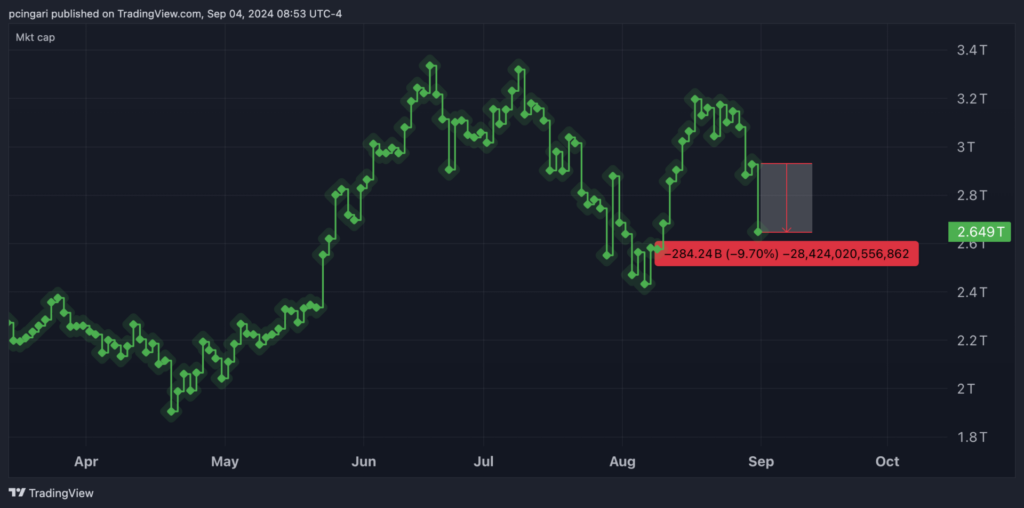Zinger Key Points
- UBS drops bull stance on ASML, cuts its price target on projection of slower earnings growth.
- ASML shares fell 6.1% in Amsterdam and 4.4% in U.S. premarket trading after the downgrade.
- Join Chris Capre on Sunday at 1 PM ET to learn the short-term trading strategy built for chaotic, tariff-driven markets—and how to spot fast-moving setups in real time.
Following Tuesday's bloodbath in the U.S. semiconductor sector, there seems to be no relief in sight as Swiss investment bank UBS downgraded ASML Holding NV ASML from Buy to Neutral Wednesday, slashing its price target on the Dutch chipmaker due to expected slower earnings growth in the coming years.
Despite ASML being recognized as one of Europe’s top technology companies, UBS analysts led by Francois-Xavier Bouvignies said "investors will likely be less willing to pay the premium multiple that the Dutch chipmaker has commanded over the last few years."
UBS first rated ASML as a Buy in August 2022 and maintained it until now. In April 2024, the bank raised the 12-month price target for the company from 880 euros ($972.87) to 1,050 euros. On Wednesday, UBS lowered the price target to 900 euros. The downgrade comes as UBS anticipates weaker earnings growth driven by a slowdown in demand for advanced semiconductor chips.
Shares of ASML dropped 6.1% in Amsterdam trading, while U.S.-listed ADRs were 4.4% lower during premarket trading in New York.
Related Link: ASML’s China Business In Crosshairs Of Dutch Government: Semiconductors At Center Of East-West Tensions
Slower Growth Ahead For ASML?
UBS forecasts that ASML's earnings per share will grow at a compound annual growth rate of 13% between 2025 and 2030, down significantly from the 24% CAGR seen from 2018 to 2025, as Proactive Investors reported.
While the bank predicts strong orders in 2025 could temporarily boost ASML’s performance, it warns of potential downside risks in 2026 and 2027.
The demand for lithography technology, ASML's specialty, is expected to plateau as the semiconductor industry faces declining demand for advanced chips used in logic and memory production. UBS said that while ASML's revenue from artificial intelligence applications will increase, AI will account for only 10%-15% of the company's total sales over the next three to five years, not enough to offset declines in other areas.
Implications For US Semiconductors: Nvidia, Intel, AMD In Focus
The ripple effect from UBS's ASML downgrade and broader concerns about the semiconductor sector continued to weigh on U.S. semiconductor stocks. The premarket session on Wednesday showed little sign of recovery after the previous day's selloff.
The VanEck Semiconductor ETF SMH fell 1.4% at 8:30 a.m. ET, following a 7.5% drop on Tuesday — the ETF’s largest single-day decline since March 18, 2020.
Similarly, the iShares Semiconductor ETF SOXX was down 1.4% in premarket trading after a 7.6% decline the previous day.
Nvidia Corp. NVDA continued its slide, falling 2% in premarket trading after suffering a dramatic 9.5% drop on Tuesday, wiping out about $280 billion in market capitalization, the largest single-day loss in its history.
Intel Corp. INTC was down 2.9%, compounding the 8.8% decline it experienced on Tuesday. The sharp drop has fueled speculation that Intel could be removed from the Dow Jones Industrial Average, adding more pressure on the stock.
In contrast, Advanced Micro Devices AMD showed signs of resilience, rising 1.8% to $139.37 in premarket trading. The gain follows the company's announcement of former Nvidia executive Keith Strier as its new senior vice president of global AI markets, a move seen as a strategic push into the booming AI space.
Chart: Nvidia Wipes Out $280B In A Single Day, The Worst Market Cap Loss Ever

Read Next:
Photo via Shutterstock.
Edge Rankings
Price Trend
© 2025 Benzinga.com. Benzinga does not provide investment advice. All rights reserved.
date | ticker | name | Price Target | Upside/Downside | Recommendation | Firm |
|---|
Trade confidently with insights and alerts from analyst ratings, free reports and breaking news that affects the stocks you care about.